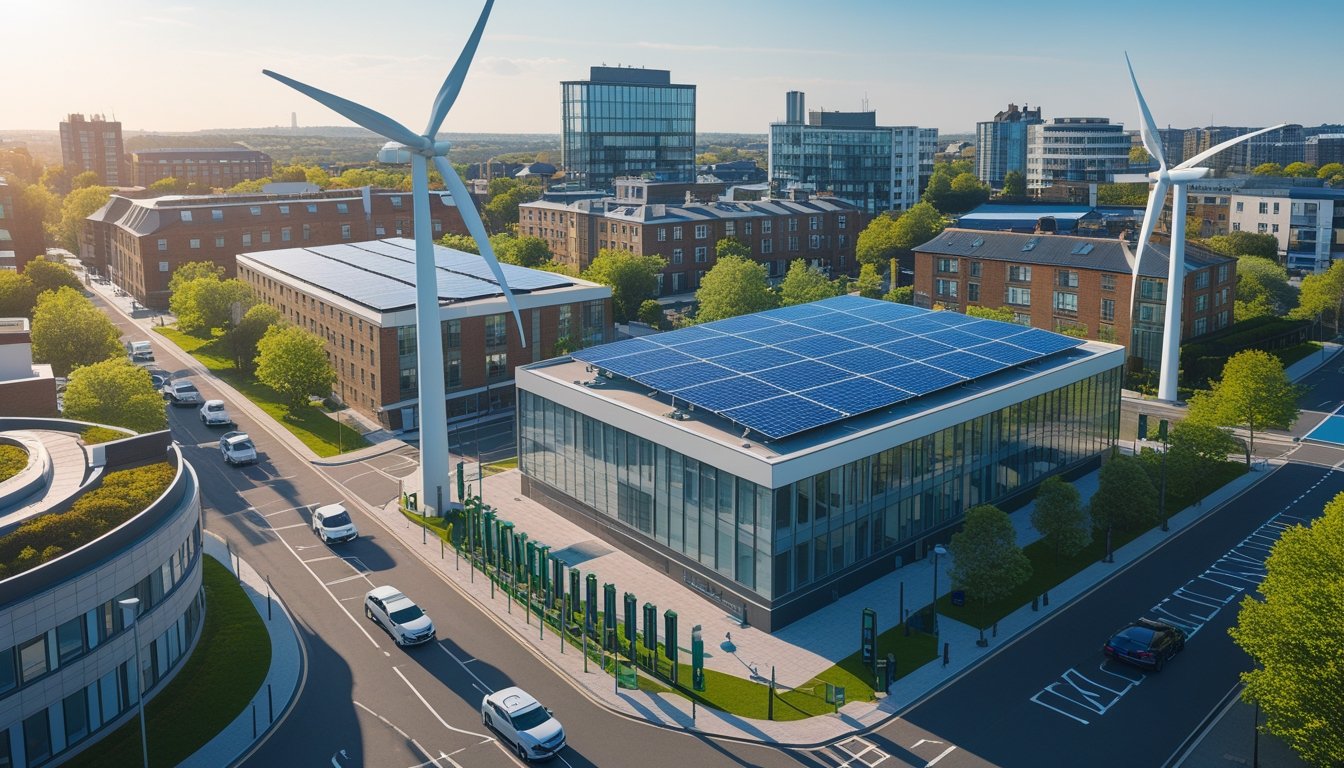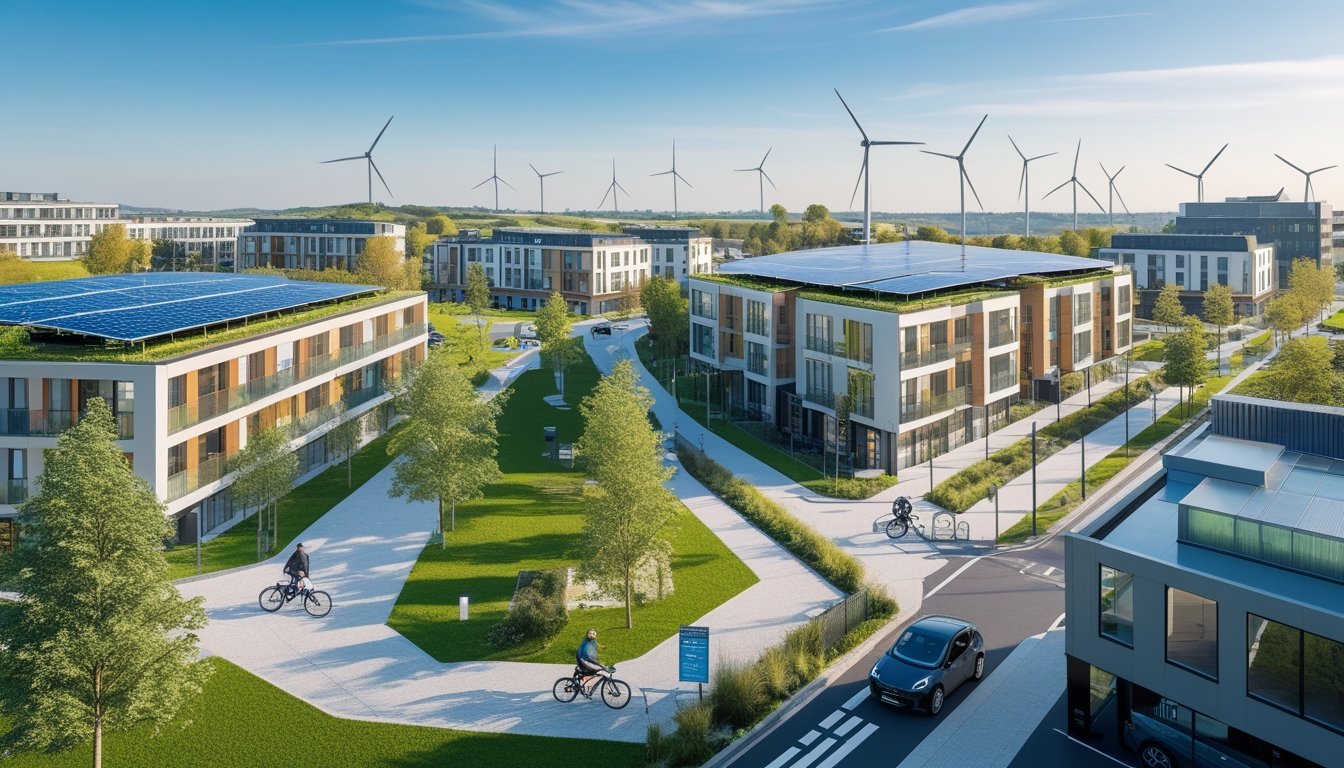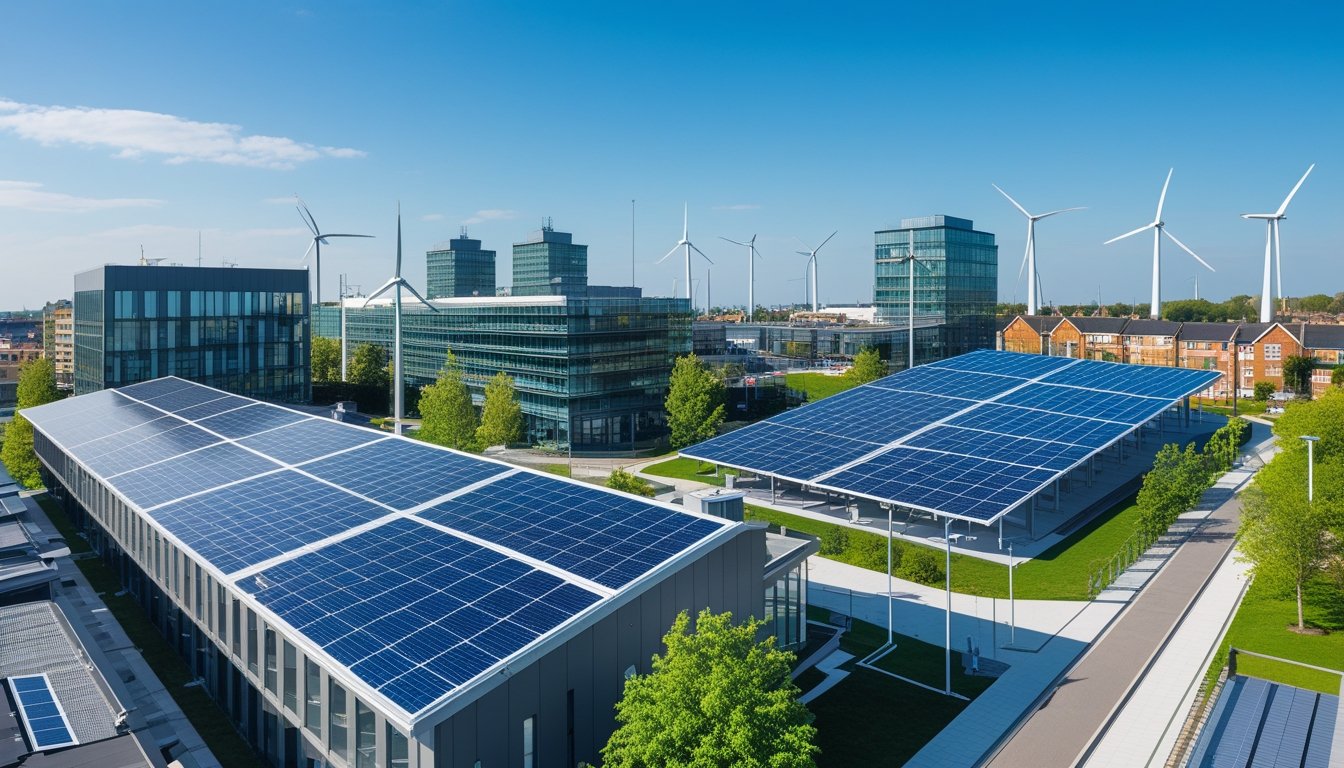Late updated: 25 Nov 2025 11:11
Written by: Oliver Bennett
Efficient Renewable Energy Solutions for UK Urban Areas: Transforming City Power Systems
Efficient renewable energy solutions are transforming urban living across the UK. As cities grow, they require sustainable energy sources to meet increasing demands while addressing environmental concerns. Our nation has made substantial progress in incorporating cutting-edge technologies like building-integrated photovoltaics and smart grids, offering promising avenues for energy management in bustling urban centres.

These advancements not only cut down emissions but also enhance the quality of life, creating resilient communities that are better prepared for the future. Incorporating renewable strategies into urban planning is more crucial than ever. By harnessing solar and wind installations, even dense city environments can substantially reduce their carbon footprint.
But what does this mean for urban planners and residents alike? We explore the practical applications and benefits of these sustainable solutions, answering questions about the integration of renewable energy into daily city living. How are cities like London and Manchester leading the charge and setting precedents for others?
Key Takeaways
- Urban areas require efficient renewable energy to meet growing demands.
- Solar and wind power are key solutions for sustainable urban planning.
- Cities are reducing their carbon footprint with innovative strategies.
Key Renewable Energy Solutions for UK Urban Areas
As UK urban areas strive to enhance sustainability, several renewable energy solutions are emerging as pivotal. Solar energy technologies, advanced wind turbines, and smart grid systems are at the forefront, addressing energy demands and improving efficiency.
Solar Panels and Building-Integrated Photovoltaics
Solar panels, particularly Building-Integrated Photovoltaics (BIPV), are transforming how cities capture solar energy. Unlike traditional panels, BIPVs integrate seamlessly with building materials such as rooftops and facades, optimising available space. This integration not only alleviates space constraints prevalent in urban settings but also improves aesthetics and energy efficiency.
The ability to harness solar power directly from building surfaces enhances energy generation capabilities. Coupled with advancements in energy-efficient technologies, these systems contribute significantly to reducing urban energy consumption. BIPVs also offer unique design flexibility, helping architects and planners innovate while meeting sustainable energy targets. As energy demand rises, these photovoltaics play a crucial role in urban renewable energy solutions.
Advanced Wind Turbines and Wind Energy Integration
Wind energy continues to make strides in UK urban areas, aided by advanced wind turbines that are quieter and more efficient. Urban turbines, specifically designed to operate at lower wind speeds, provide clean energy solutions even in densely populated regions. These innovations mitigate traditional challenges associated with noise and space, facilitating easier integration into the urban landscape.
The renewable energy output from turbines plays a critical role by complementing solar installations, ensuring a balanced energy mix. As residential and commercial energy demand grows, integrating wind energy becomes vital for maintaining energy security. Furthermore, urban planners are increasingly incorporating wind energy into new developments, driving forward the transition to sustainable energy systems.
Smart Grids and Energy Storage Technologies
Smart grids revolutionise how we manage and deliver energy, crucial for efficient urban energy systems. These grids leverage Artificial Intelligence (AI) and Internet of Things (IoT) capabilities to optimise energy distribution and reduce waste. By adjusting to real-time energy consumption patterns, smart grids enhance reliability and operational efficiency.
An essential component is energy storage technologies, such as advanced battery storage systems. These systems store excess energy generated from renewable sources, allowing for consistent energy availability even during peak demand. This capability is fundamental in urban settings where energy consumption is high and fluctuating. Together, smart grids and energy storage support a resilient urban energy infrastructure, pushing UK cities towards a sustainable future.
Urban Sustainability and Infrastructure Strategies

To create sustainable urban environments in the UK, we must focus on energy efficiency, decarbonising transportation, and integrating green spaces into our urban planning. By implementing these strategies, we aim to significantly reduce carbon emissions and mitigate climate change impacts while enhancing the quality of urban living.
Energy Efficiency and Building Design
Improving the energy efficiency of buildings is critical for reducing carbon emissions. Retrofitting existing structures with better insulation and heat pumps can drastically decrease energy consumption. Rooftop gardens offer additional insulation and help manage urban temperatures. New builds should incorporate sustainable materials and designs prioritising natural light and ventilation.
Smart grid infrastructure plays a crucial role, enabling efficient energy distribution and integration of renewable energy sources like solar and bioenergy. Grants and subsidies can encourage developers to align with these sustainability goals, ultimately promoting cleaner energy usage. Engaging communities is essential in supporting these initiatives, encouraging local participation and awareness of the benefits associated with energy-efficient living.
Decarbonising Urban Transport and Mobility
To significantly reduce greenhouse gas emissions, we are pivoting towards cleaner transport solutions. Electric vehicles (EVs) are at the forefront of this shift, supported by a growing network of charging stations across urban landscapes. The use of fuel cells offers another promising alternative for clean transport energy.
Public transport systems must be efficient and widely accessible, offering an appealing alternative to private car use. Investment in cycling lanes and pedestrian paths also encourages more eco-friendly travel choices. These steps play an important role in reducing urban traffic congestion and improving air quality. Through urban planning, we can ensure that transport infrastructure aligns with broader sustainability goals, aiding the transition to a low-carbon future.
Green Infrastructure and Urban Planning
Green infrastructure enhances urban sustainability by incorporating nature into city landscapes. Parks and green spaces provide vital zones for recreation and biodiversity, contributing to mental health and wellbeing. Urban planners should prioritise the integration of green energy solutions and the preservation of natural ecosystems within urban environments.
Community engagement is critical in fostering a sense of ownership and responsibility for these communal spaces. Innovative solutions like energy centres can serve multiple purposes, including the production and distribution of renewable energy while creating opportunities for education and outreach. By embracing these strategies, we are paving the way for more vibrant and sustainable urban environments in the UK.
Frequently Asked Questions

In the pursuit of efficient renewable energy solutions for UK urban areas, numerous queries arise. We address some of the prominent questions regarding renewable energy sources, challenges, and the role of local governments.
What are the most cost-effective renewable energy sources suitable for urban environments in the UK?
Solar and wind energy stand out as the leading cost-effective options for urban centres in the UK. These technologies have seen advances that lower costs and improve efficiency. Additionally, integrating bioenergy and district heating can further enhance urban energy systems.
How can solar power technology be optimised for performance in UK cities?
To maximise solar power output in cities, we must focus on building-integrated photovoltaics and optimised rooftop installations. These approaches ensure efficient use of space and capture maximum sunlight, even in densely populated areas.
What are the key challenges and solutions for integrating wind energy systems in urban areas?
Integrating wind energy in cities faces challenges like space constraints and noise concerns. Solutions include the development of quieter urban wind turbines and hybrid systems that combine wind with other renewable sources, thus stabilising energy production.
How can local governments encourage the adoption of renewable energy infrastructure in densely populated regions?
Local governments can implement incentive programmes, streamline planning approvals, and invest in research and pilot projects. These measures support the integration of renewable technologies and foster community engagement in sustainable practices.
What recent advancements in energy storage can support consistent renewable energy supply in urban settings?
Recent advancements in battery technology and energy storage systems are crucial. These include the development of longer-lasting and more efficient batteries, which help maintain a consistent energy supply despite the variability of renewable sources.
How does the UK's urban planning policy accommodate the transition to renewable energy sources?
Urban planning policies are increasingly accommodating renewable energy by incorporating sustainability goals into building codes and development plans. These policies facilitate the integration of technologies like solar panels and wind turbines, promoting a greener urban landscape.
